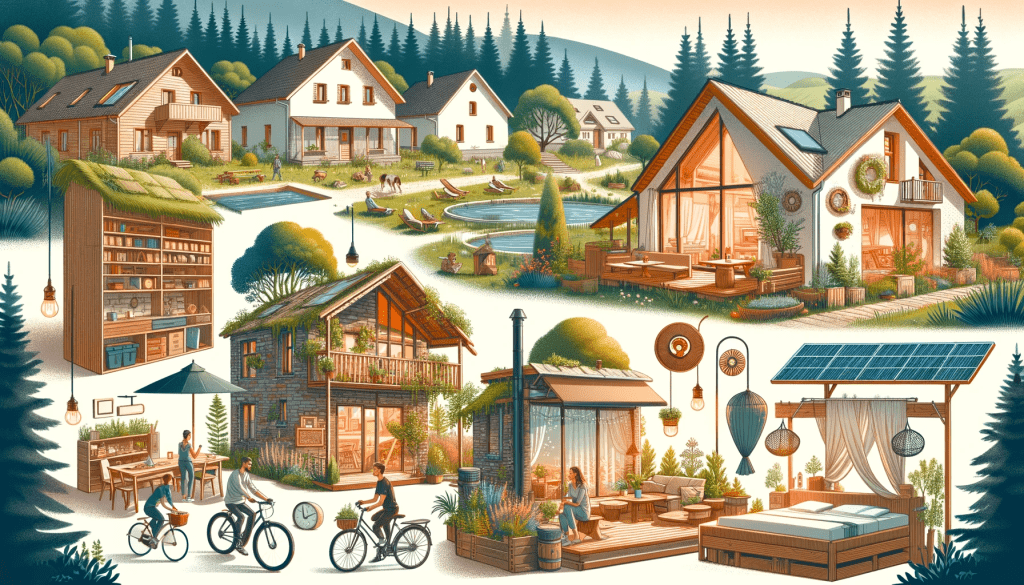Eco-Friendly Accommodations in Europe: A Growing Trend
In recent years, the concept of sustainable travel has taken root in Europe, marking a significant shift in how travelers experience the continent. This growing trend represents a departure from traditional tourism, where the focus was primarily on exploration and adventure. Instead, eco-conscious travelers are seeking something more—a way to explore Europe’s cultural and natural riches while respecting the environment and local communities.
Table of Contents
I-Embracing Eco-Consciousness

Europe, known for its rich cultural heritage and diverse landscapes, is uniquely positioned to lead the way in sustainable travel. The continent’s commitment to environmental conservation and its proactive stance on sustainability initiatives make it a prime destination for those who want to travel with a conscience. From the rolling hills of Tuscany to the pristine fjords of Norway, Europe offers a multitude of experiences that align with the principles of sustainable tourism.
Transforming the Tourism Landscape
This shift in travel preferences is not merely a passing trend. It’s catalyzing a transformation in the European tourism industry. Hotels, tour operators, and other key players are adapting by adopting eco-friendly practices. These include reducing energy consumption, minimizing waste, and incorporating sustainable materials into their operations. This transformation is vital for preserving Europe’s unique environments and cultural heritage while ensuring that tourism remains a sustainable industry for generations to come.
II. Green Hotels in Europe: Combining Luxury with Sustainability

As the demand for sustainable travel grows, a new breed of accommodations is emerging—green hotels. These establishments are setting the standard for luxurious yet environmentally responsible stays.
Features of Green Hotels
Green hotels are distinguished by a range of features that prioritize sustainability. They harness renewable energy sources like solar and wind power to reduce their carbon footprint. In addition, they employ water-saving measures, including low-flow showerheads and toilets, as well as rainwater harvesting systems. Eco-friendly materials are used in construction and decor, and comprehensive recycling and composting programs are in place. Moreover, green hotels often opt for local and organic food sources, supporting nearby producers and reducing the environmental impact of food transportation.
Notable Green Hotel Gems
Europe boasts a collection of remarkable green hotels, each offering a unique blend of luxury and sustainability:
1. Whitepod Eco-Luxury Hotel, Switzerland: Nestled in the Swiss Alps, this hotel features eco-friendly geodesic domes that provide a unique and luxurious experience while minimizing environmental impact.
2. Bankside Hotel, London: Located in the heart of London, the Bankside Hotel stands out for its commitment to sustainability. It boasts a zero-landfill policy and actively engages with the local community.
3. Ion Adventure Hotel, Iceland: This Icelandic hotel is renowned for its sustainable design and harnessing the power of geothermal energy, providing an eco-conscious yet luxurious escape in the rugged Icelandic landscape.
These green hotels not only offer a lavish retreat but also serve as shining examples of how sustainable travel can be seamlessly integrated into the luxury hospitality sector.
III. Sustainable Practices Beyond Green Hotels

While green hotels play a pivotal role in the sustainable travel landscape, Europe offers a wealth of options for eco-conscious travelers seeking a diverse range of accommodations. Here, we delve into some additional sustainable lodging choices:
1. Eco-Lodges Amidst Nature’s Splendor
For travelers yearning for a deeper connection with nature, Europe boasts a selection of eco-lodges nestled in pristine natural settings. These lodges provide a unique opportunity to immerse oneself in the great outdoors while treading lightly on the environment. From treehouse accommodations in the Black Forest to remote cabins in the Scottish Highlands, eco-lodges blend seamlessly with their surroundings, offering an unparalleled experience of serenity and sustainability.
2. Sustainable Hostels for Budget Travelers
Sustainable travel is not limited to luxury options; budget-conscious travelers can also embrace eco-friendly accommodations. Sustainable hostels have been on the rise across Europe, providing affordable stays with a focus on environmental responsibility. These hostels often feature energy-efficient lighting, recycling initiatives, and community engagement programs. They offer a fantastic way for backpackers and budget travelers to explore Europe while minimizing their ecological footprint.
IV. The Impact on Traveler Experiences
The shift towards eco-friendly accommodations in Europe isn’t just about reducing environmental impact; it’s about enhancing the traveler’s experience. Sustainable stays offer unique and enriching experiences that go beyond traditional hospitality. Here’s how:
1. Authentic Cultural Immersion
Many eco-friendly accommodations prioritize local engagement. They encourage guests to interact with the surrounding communities, fostering a deeper understanding of local culture and traditions. Whether it’s participating in a cooking class with a local chef or joining a community-led eco-tour, sustainable stays offer opportunities for authentic cultural immersion.
2. Connecting with Nature
Staying in green hotels, eco-lodges, or even sustainable hostels often means being closer to nature. Guests can wake up to the sound of birdsong, take scenic hikes in nearby forests, or stargaze in areas with minimal light pollution. These experiences remind travelers of the intrinsic connection between humans and the natural world.
3. Peace of Mind
Choosing eco-friendly accommodations provides travelers with a sense of satisfaction and peace of mind. Knowing that your stay supports sustainable practices, preserves the environment, and benefits local communities adds a layer of fulfillment to your journey.
V. Your Sustainable Travel Adventure Awaits
In conclusion, Europe’s commitment to sustainable travel offers a plethora of choices for eco-conscious explorers. Whether you opt for a luxurious green hotel, an eco-lodge in the wilderness, or a sustainable hostel on a budget, your choices can contribute to the preservation of Europe’s beauty and cultural diversity.
By embracing eco-friendly accommodations, travelers become part of a larger movement—one that prioritizes environmental responsibility and ethical travel. So, as you plan your next European adventure, consider the impact your stay can have. Sustainable travel isn’t just a trend; it’s a meaningful way to experience Europe while leaving a positive mark on the planet and its people.
VI. Unique Experiences: Treehouses and Eco-Cabins
When it comes to sustainable accommodations, few options offer the charm and uniqueness of treehouses and eco-cabins. These innovative lodging choices not only provide memorable experiences but also prioritize sustainability in their design and operation.
The Magic of Treehouses
Treehouses have a timeless appeal that transcends age. These elevated retreats offer a connection to nature that is second to none. But what makes them truly remarkable is their commitment to sustainability.
Sustainability Features: Treehouses are often constructed using eco-friendly materials and methods that minimize their impact on the surrounding trees. Many are designed to be off-grid, relying on renewable energy sources like solar panels. They integrate seamlessly into the forest canopy, allowing guests to immerse themselves in the natural world without disrupting it. It’s a perfect blend of adventure and sustainability.
Eco-Cabins: A Cozy Haven
Eco-cabins, nestled in serene natural settings, provide a cozy haven for travelers seeking tranquility and sustainability.
Sustainability Features: These cabins are built with a focus on energy efficiency, often featuring well-insulated structures and energy-saving appliances. They utilize rainwater harvesting systems and employ composting toilets to reduce water waste. The remote locations of eco-cabins minimize light pollution, offering guests a front-row seat to starry night skies. Staying in an eco-cabin is an invitation to slow down, unplug, and appreciate the simplicity of sustainable living.
VII. Rural Retreats: Eco-Sustainable European Farm Stays
For a truly immersive and sustainable experience, consider the concept of farm stays in Europe. These rural retreats offer a unique opportunity to connect with the land, its people, and sustainable agriculture practices.
Exploring Farm Stays
Farm stays invite travelers to step into the shoes of farmers and experience rural life firsthand. Guests often have the chance to participate in farm activities, from harvesting crops to feeding animals. It’s a chance to learn about traditional farming methods and savor farm-fresh produce.
Contribution to Sustainable Agriculture and Tourism: Farm stays play a crucial role in sustainable agriculture by supporting small-scale farmers and promoting organic farming practices. These experiences not only benefit local communities but also educate travelers about the origins of their food and the importance of sustainable food systems. Moreover, by choosing farm stays, travelers actively contribute to the preservation of rural landscapes and cultural heritage, ensuring that these traditions endure for future generations.
X. Conclusion: Your Role in Promoting Sustainable Travel
In conclusion, the choices we make as travelers have a profound impact on the places we visit and the world we share. Opting for eco-friendly accommodations is not just a trend; it’s a responsibility.
The Importance of Choosing Eco-Friendly Accommodations
By choosing eco-friendly accommodations, you become a steward of the environment and a supporter of local communities. These accommodations prioritize sustainability, reducing their carbon footprint, conserving resources, and supporting ethical practices. Your stay becomes a positive force for preserving Europe’s diverse landscapes, cultural heritage, and natural wonders.
Your Contribution to Sustainable Tourism Practices
As you embark on your European adventures, consider the following ways to contribute to sustainable tourism practices:
- Support Local Economies: Choose accommodations that source locally and engage with nearby communities. Your spending supports the livelihoods of local residents.
- Respect Nature: When staying in eco-lodges or cabins, respect the natural surroundings. Leave no trace and immerse yourself in the beauty of nature without causing harm.
- Learn and Share: Educate yourself about the eco-friendly initiatives of your chosen accommodations and share your experiences with others. Spread the word about responsible travel.
- Reduce, Reuse, Recycle: Follow sustainable practices during your stay, such as reducing energy and water consumption and participating in recycling programs.
By adopting these practices and choosing eco-friendly accommodations, you become an advocate for sustainable tourism, leaving a positive mark on the planet and its people.
References and Resources
For further reading and research on eco-friendly travel, consider exploring these resources:
- Green Key – Eco-label for Tourism: Learn about the Green Key eco-label program, which certifies environmentally friendly hotels and accommodations.
- Global Sustainable Tourism Council (GSTC): Explore the GSTC’s resources and guidelines for sustainable tourism.
- Sustainable Travel International: Find information on sustainable travel practices and initiatives worldwide.
- European Environment Agency: Access reports and data on environmental issues in Europe, including sustainable tourism.
- Local and Regional Tourism in Europe: A New Perspective: A book that delves into the concept of local and regional tourism, emphasizing sustainability.
With these resources, you can continue to explore and support the principles of eco-friendly travel, making informed choices that benefit both your travel experiences and the planet.